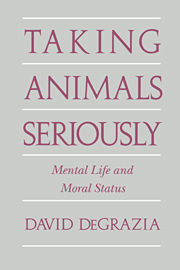Book contents
- Frontmatter
- Contents
- Acknowledgments
- 1 A short primer on animal ethics
- 2 The coherence model of ethical justification
- 3 Animals' moral status and the issue of equal consideration
- 4 Motivation and methods for studying animal minds
- 5 Feelings
- 6 Desires and beliefs
- 7 Self-awareness,language,moral agency,and autonomy
- 8 The basics of well-being across species
- 9 Back to animal ethics
- Index
3 - Animals' moral status and the issue of equal consideration
Published online by Cambridge University Press: 05 June 2012
- Frontmatter
- Contents
- Acknowledgments
- 1 A short primer on animal ethics
- 2 The coherence model of ethical justification
- 3 Animals' moral status and the issue of equal consideration
- 4 Motivation and methods for studying animal minds
- 5 Feelings
- 6 Desires and beliefs
- 7 Self-awareness,language,moral agency,and autonomy
- 8 The basics of well-being across species
- 9 Back to animal ethics
- Index
Summary
INTRODUCTION
How are we to understand the moral status of animals? Are animals due any moral consideration at all? If not, why not? If so, do animals deserve consideration simply because of the way our treatment of animals affects us humans? Or is it because animals' interests have moral importance in their own right? If animals' interests matter in their own right, how much do they matter? Should they be given as much consideration as human interests? If so, what does that mean, exactly? What would such equal consideration amount to? And if not, in what ways— or how much—do animals' interests matter?
Sometimes importantly different questions regarding the moral status of animals are not clearly enough distinguished. Failure to distinguish different questions often leads to misunderstanding of opponents' arguments and then to proud refutations of views no one holds. (For example, the medical literature contains numerous arguments against the view that animals—sometimes, all animals—and humans are alike in every morally significant respect. But no one, to my knowledge, holds that view.) For the sake of clarity, the basic questions asked in the previous paragraph may be broken down somewhat more formally as follows:
1. Does the treatment of animals raise ethical issues at all?
2. If not, why not?
3. If so, do animals' interests matter in their own right?
4. If not, why not? How should we treat them, and why?
[…]
- Type
- Chapter
- Information
- Taking Animals SeriouslyMental Life and Moral Status, pp. 36 - 74Publisher: Cambridge University PressPrint publication year: 1996



